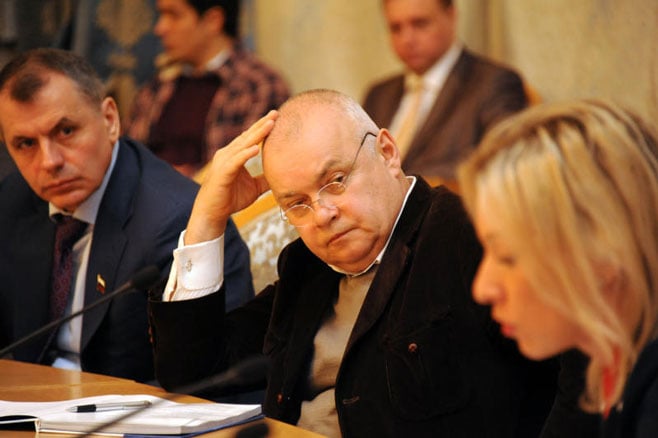
London-based bank Barclays has frozen the accounts of major state-run Russian news agency Rossiya Segodnya, in a move that may be tied to Britain’s sanctions on its firebrand chief, Dmitry Kiselyov, news agency RIA Novosti reported Monday.
Barclays has not issued an official statement saying it has frozen the accounts, but an unnamed bank representative told RIA that the accounts had been frozen and that an official announcement would be forthcoming. When contacted for comment by The Moscow Times, the bank said that it did not comment on individual client accounts.
Russia’s Foreign Ministry has asked the British government to immediately clarify the status of Rossiya Segodnya’s bank account at Barclays, according to a statement posted to the ministry’s website. According to the ministry, the bank account has been frozen since July 8.
The alleged asset freeze may be related to EU sanctions on agency head Kiselyov, a banking source told RIA. The EU sanctioned Kiselyov in March last year as part of a series of asset freezes and travels bans on prominent supporters of Moscow’s annexation of Ukraine’s Crimean Peninsula.
Russia’s Foreign Ministry also said it believed the account freeze was tied to British sanctions on Kiselyov.
Kiselyov, formerly a liberal media figure, has become well-known for his weekly anti-Western diatribes on state-owned television, where he once boasted of Russia’s ability to turn the U.S. into “radioactive ash.”
A representative of Barclays bank did not explain the reasons for blocking Rossiya Segodnya’s account when contacted, RIA reported.
Kiselyov called the freezing of Rossiya Segodnya’s account “censorship.”
“What kind of freedom of the press or democracy we can talk about in Great Britain if one of the major news agencies in the world is prevented from working in the country?” RIA Novosti quoted Kiselyov as saying. Kiselyov did not confirm that Rossiya Segodnya’s account had actually been closed.
French authorities also reportedly froze the news agency’s accounts in June, news agency Interfax reported at the time, citing head editor Margarita Simonyan.
The assets were frozen alongside a number of state-held accounts as part of a $50 billion settlement awarded to ex-shareholders of defunct oil firm Yukos following an international arbitration court’s decision that the Russian state had illegally expropriated the company in the mid-2000s.





